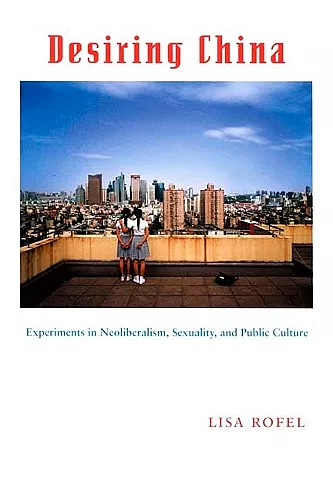Desiring China
Experiments in Neoliberalism, Sexuality, and Public Culture
Format:Hardback
Publisher:Duke University Press
Published:10th May '07
Currently unavailable, and unfortunately no date known when it will be back

An ethnography of gender, sexuality, and consumption in post-socialist China
Argues that the creation of such "desiring subjects" is at the core of China's contingent, piece-by-piece reconfiguration of its relationship to a post-socialist, neo-liberal-dominated world.Through window displays, newspapers, soap operas, gay bars, and other public culture venues, Chinese citizens are negotiating what it means to be cosmopolitan citizens of the world, with appropriate needs, aspirations, and longings. Lisa Rofel argues that the creation of such “desiring subjects” is at the core of China’s contingent, piece-by-piece reconfiguration of its relationship to a post-socialist world. In a study at once ethnographic, historical, and theoretical, she contends that neoliberal subjectivities are created through the production of various desires—material, sexual, and affective—and that it is largely through their engagements with public culture that people in China are imagining and practicing appropriate desires for the post-Mao era.
Drawing on her research over the past two decades among urban residents and rural migrants in Hangzhou and Beijing, Rofel analyzes the meanings that individuals attach to various public cultural phenomena and what their interpretations say about their understandings of post-socialist China and their roles within it. She locates the first broad-based public debate about post-Mao social changes in the passionate dialogues about the popular 1991 television soap opera Yearnings. She describes how the emergence of gay identities and practices in China reveals connections to a transnational network of lesbians and gay men at the same time that it brings urban/rural and class divisions to the fore. The 1999–2001 negotiations over China’s entry into the World Trade Organization; a controversial women’s museum; the ways that young single women portray their longings in relation to the privations they imagine their mothers experienced; adjudications of the limits of self-interest in court cases related to homoerotic desire, intellectual property, and consumer fraud—Rofel reveals all of these as sites where desiring subjects come into being.
“Brilliant and wide-ranging, Desiring China deftly interweaves analysis of the production of post-socialist citizen-subjects in China with a transformative critique of the literature on ‘neoliberalism.’ This tour de force is theoretically expansive, ethnographically rich, and a compelling read. It deserves a broad audience in cultural studies, anthropology, queer and feminist theory, Asian studies, and contemporary theory.”—Dorinne Kondo, University of Southern California
“This is a brilliant ethnography of how emotions unleashed by neoliberalism are configuring post-Tiananmen culture. With wit and sparkle, Lisa Rofel introduces us to young Chinese who live for the moment, experimenting with sex, love, and cosmopolitanism, without (ever) forgetting their love of culture and of nation. Desiring China is an exciting work of cultural interpretation, and it is an innovative guide for studying the cultural practices and political possibilities in globalizing China.”—Aihwa Ong, author of Neoliberalism as Exception and coeditor of Privatizing China
“Desiring China is an exciting and important new work that pushes the boundaries of ethnography and offers new critical frameworks for discussions of neoliberalism and culture.” -- Patti Duncan * NWSA Journal *
“Desiring China will surely take its place as an indispensable work that scholars in queer studies, cultural studies, and Chinese studies have been ‘desiring’ for a long time.” -- Alvin Ka Hin Wong * GLQ *
“Lisa Rofel’s volume is distinguished by its explicit engagement with U. S. politics through an extensive examination of China-in-transformation. Rofel’s analysis centers on public cultural spheres and foregrounds the thesis that globalization is no longer external to China but internal to its economic and cultural productions of commodities, public spheres, subjectivities, and desire.” -- Yan Hairong * Journal of Asian Studies *
“This book is theoretically expansive and ethnographically rich, weaving discussions of the production of post-socialist subjectivities with critiques of the literature on ‘neoliberalism.’ It should be welcomed by a wide range of scholars who have an interest in cultural studies, China and Asian studies, queer and feminist theory, and contemporary theory.” -- Tiantian Zheng * The China Quarterly *
ISBN: 9780822339359
Dimensions: unknown
Weight: 513g
264 pages